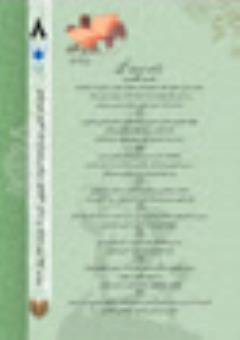The L.N.P Usage in Golestan Saadi's Anecdotes with an Emphasis on the Swish Pattern
Subject Areas : Comparative Literature Studies
Mousa Zare
1
![]() ,
Kobra Nodehi
2
*
,
Kobra Nodehi
2
*
![]() ,
Mohammad Ali Khaledyan
3
,
Mohammad Ali Khaledyan
3
1 - Ph.D. Student of Persian Language and Literature, Gorgan Branch, Islamic Azad University, Gorgan, Iran.
2 - associate professor, Department of Persian Language and Literature, Gorgan Branch, Islamic Azad University, Gorgan, Iran.
3 - Assistant Professor and Faculty Member of Islamic Azad University, Gorgan Branch
Keywords: N. L. P, Saadi, Golestan, Swish (relocation), Stable self-esteem.,
Abstract :
The Swish pattern was first introduced in 1985 by Richard Bandler (Psychologist) and John Grinder (Linguist), the founders of the L.N.P field. According to this model, pleasant and purposeful behaviors are replaced by unpleasant, forced, and unwanted behaviors with the help of internal resources. Among the great poets and writers of Persian literature aligned with this method of treatment, Saadi is an experienced and practical teacher who, in Golestan, by applying the model of immediate displacement, replaces unpleasant and inhibiting behaviors with pleasant and joyful behaviors with the help of internal resources. The purpose of this research, which has analyzed all chapters of Golestan with analytical and descriptive methods, is to use the L.N.P in Golestan Saadi's anecdotes with an emphasis on the Swish pattern. The hypothesis emphasizes the issue that everyone has the necessary and sufficient resources to create pleasant images and the results they are looking for and can take action from internal resources to produce positive and uplifting images by accurately knowing the aggressive and disturbing stimuli. With this aim, the results of the findings in Golestan showed that effectively confronting the trap and freeing the mind from the captivity of invasive images can be the reason for the emergence of good ideas and the development of pleasant feelings in the mind, and as a result, it will be an effective reason to prevent its spread to others. Also, this powerful encounter will bring vitality, liveliness, and stable self-esteem.
References
Books
1. Holy Quran. (2012). Translated by Abolfazl Bahrampour, Tehran: Avaye Quran. (In Persian)
2. Andreas, S. (2021). NLP: the new technology of achievement. Translated by Mahmoud Pourazad, Tehran: Zehn Ziba. (In Persian)
3. Agness, L. (2022). Change your life with NLP: the powerful way to make your whole life better. Translated by Nafiseh Tonekaboni, Tehran: Noandish. (In Persian)
4. Bandler, R., Roberti, A., & Fitzpatrick, O. (2018). The ultimate introduction to NLP: how to build a successful life. Translated by Reza Omrani and Mehrdad Houshmand, Tehran: Noandish. (In Persian)
5. Boyes, C. (2020). 5-Minute NLP. Translated by Maryam Malakouti, Tehran: Noaandish. (In Persian)
6. Deeney, W. (2021). NLP and Dark Psychology. Translated by Mahmoud Pourazad, Tehran: Zehn Ziba. (In Persian)
7. Harris, C. (2022). NLP made easy: an easy - to - follow introduction to NLP. Translated by Leili Mehrpour, Tehran: Pol. (In Persian)
8. Hayes, P. (2019). Counseling and counseling in the light of neuro-verbal programming. Translated by Seyed Hossein Kazemi, Tehran: Ashraghi. (In Persian)
9. James, W. (2018). Pragmatism. Translated by AbdolKarim Rashidian, Tehran: Elmi & Farhangi. (In Persian)
10. Pakzat, F., & Roshangar, R. (2019). 9 golden steps of change with N.L.P. Tehran: Abangan Iranian. (In Persian)
11. Ready, R., & Burton, K. (2018). Building rapport with NLP in a day for Dummies. Translated by Farshid Ghahremani, Tehran: Avand Danesh. (In Persian)
12. Richardson, J. (2021). The magic of rapport: how you can gain personal power in any situation. Translated by Mahdi Qarachedaghi, Tehran: Asim. (In Persian)
13. Saadi, M. (2021). Golestan, Tehran: Payam Edalat. (In Persian)
14. Sayre, K. (2019). Unstoppable confidence! : How to use the power of NLP to be more dynamic and successful. Translated by Elham Rasekhifar, Tabriz: Yaran. (In Persian)
Articles
1. Ebadi, R., & Mohammadzadeh, M. (2018). The comparative of Saadi's Golestan and Magamat of Badia-Al-Zaman Hamadani. Jostarnameh Journal of comparative Literature Studies, 2(3), 1-17.
2. Sadeghzadeh, M., & Dehghan Banadaki, L. (2018). Personality psychology Components Based on Jung’s View in Anecdotes of Saadi’s Bustan. Jostarnameh Journal of comparative Literature Studies, 1(2), 37-61. (In Persian)

